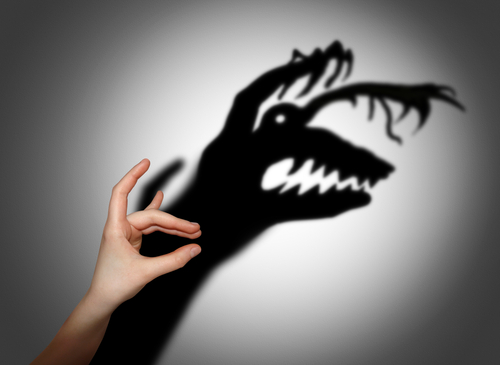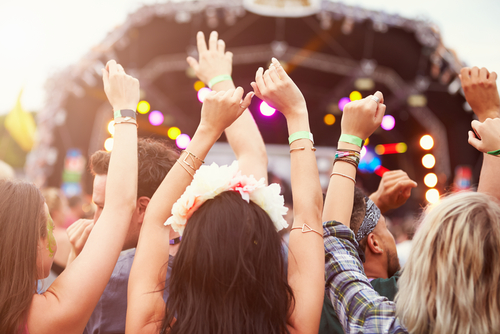
by A Women in Sobriety | Jun 25, 2015 | Addiction Articles, Recovery
Fear Won’t Kill You!
Fear won’t kill you, but it definitely feels like it will! I say this as a woman in long-term recovery who’s faced more than a few “fear situations” in my time.

Look, fear sucks. We’re told in treatment that fear is responsible for a large portion of the stupid actions we took while drinking and drugging. We’re told how corrosive and poisonous fear is, how it can warp even the best intentions.
What we may not be told, though, is how to get through fear. I was told to remember that fear stands for “forgetting everything’s all right,” but that didn’t help me much. I mean, how do we take that and put it into our lives? How can I, a fear based alcoholic, remember that everything’s all right?
With those questions in mind, I put together a guide for walking through fear in early-sobriety (or any other time in sobriety). I hope it helps you all!
Talk to Someone
This is probably the easiest way to get rid of fear (it was for me anyway), so it tops the list. Just talk to someone! It can be your sponsor, a friend, a significant other, someone at work…it can be anyone!
It doesn’t matter who you talk to, simply talking to someone makes the fear so much easier to deal with. If it’s anxiety-based fear, like a lot of mine was, then this cuts the anxiety in half.
Talking to someone could also take the form of getting a therapist. This is a great tool for women, or anyone, in early-sobriety. After all, there’s a lot more going on than simply stopping our drug and alcohol abuse!
Go to a Meeting
This tip connects back to talking to someone. Sometimes the simple act of connecting with other human beings is all we need to kick fear’s butt.
Go to a meeting. Surround yourself with other alcoholics and addicts. Surround yourself with your people! If you can, raise your hand to share. You’ll be amazed how many people come up to you after the meeting and say they know exactly what you shared about.
See, fear is based in isolation. It’s based in thinking we’re different, inferior, or fundamentally wrong. One of the easiest ways to break this type of thinking is to be around people who reassure us we’re not different. We’re the same as them. We’re okay!
Pray

The simple act of praying can help beat the heck out of fear. The way it was explained to me was like this – alcoholics and addicts are fearful people. We’re afraid we won’t get something we want or we’ll lose something we have.
The fear of those two situations causes us all kinds of trouble. It’s also all based in self. Not getting something we want or losing something we have is inherently selfish.
Guess what gets rid of selfishness? Prayer! It connects us to a Higher Power. That power, whatever it is, then allows us to think of other people before ourselves. If we’re no longer being selfish, then the fear of losing something we have or not getting something we want goes away.
Breathing Techniques
Breathing techniques are priceless when it comes to anxiety-based fear. Things like panic attacks and social anxiety can be effectively controlled by simply changing how we breathe.
Fear that’s anxiety based is a physiological response. It’s our fight or flight response. By changing how we take in oxygen, we can calm the body down. We can slow our heart rate and decrease blood pressure.
These, in turn, will make us calmer and help to diminish whatever fear we’re feeling.
Help Someone
This goes back to prayer and the idea that fear is based in selfishness. If we’re not being selfish, then we’re not going to be afraid either! This isn’t always the case, but it is a lot of the time.
So, if you’re scared, nervous, anxious, or feeling any of the other hundred ways fear manifests itself, go help someone! Not only will you be doing something selfless rather than selfish, but you’ll also be connecting with another human being.
That’s like a double whammy of fear beating goodness!
It doesn’t matter how much or how little you help someone out. It could be holding a door open for someone, helping an older person cross the street, or giving someone a ride. The simple fact you’re doing something for someone else is all that matter.
Take a Nap
Let me just say this isn’t the best advice. It’s not a long-term solution and offers no real emotional or mental benefits. Still, it helps in the short-term.
If you’re scared of something, whatever that may be, take a nap! The very act of falling asleep relaxes the body. It’s similar to using breathing techniques to calm down.
Plus, who doesn’t love naps? They’re like my favorite part of the day!

by Sally Rosa | Jun 18, 2015 | Addiction Articles, Recovery
Can Listening to Certain Music Make You Relapse?
I’ve asked friends this question over the last few weeks. Their response has been overwhelmingly NO! Still, it’s a question worth asking and one that’s been on my mind a lot lately.

See, the first rehab I ever went to, way back at eighteen years old, advised me not to listen to certain music until I had a year sober. They said I shouldn’t listen to music I liked when I was using, music that glorifies drugs or alcohol, or music made by active addicts and alcoholics.
While I sort of agree with the first point, not listening to music I got high to, I don’t know about those other two ideas.
For example, I LOVE Pink Floyd. Does being in early-recovery mean I can’t listen to “Comfortably Numb?” I also love The Beatles. Does being in early-sobriety mean I can’t listen to Sgt. Pepper’s?
Maybe I’m just overthinking things. I’ve been known to do that (hello – alcoholic here!). I’m not so sure though. Let’s explore this idea of music in early-recovery being a trigger a bit more in-depth.
Were My Therapists onto Something?
I don’t believe in triggers. I’ve said it before and, most likely, I’ll say it many more times. That’s just my opinion though. Everyone has different opinions and everyone is entitled to their own! That little nugget of wisdom was learned the hard way!
So, when my therapist in rehab told me their opinions, that certain music is triggering, I initially disregarded it. They were telling me that I had to go an entire year without listening to my two favorite genres – classic rock and hip hop (weird mix, I know).
I didn’t want to hear that! I was going through ten million different things. I needed the comfort blanket that music provided me. At least, that’s what I thought at the time.
Looking back on their advice, it wasn’t half bad. Plus, they were coming from a place of compassion and care. At the time, though, I just thought they were evil old men who were out of touch with today’s culture.
Whether you believe in triggers or not, there’s something to be said for avoiding triggering events in the early days of sobriety. As we grow in our sobriety, as we effect a spiritual awakening and connection, we’re free to do whatever we want (as long as it fits within spiritual principles, of course).
Times are hard during those early days though. I don’t know if listening to Led Zeppelin would have caused me to relapse. I don’t know if listening to 50 Cent would have caused me to relapse. I don’t know if listening to the same music I nodded out to would have caused me to relapse.
But guess what? I stayed away from all that music while I was in rehab, and in the months after, and relapsed anyway.
The Case for Listening to Whatever You Want
I kind of laid this out above, but I’ll repeat it because us alcoholics and addicts are hardheaded. After we become connected to a power greater than ourselves, the obsession to drug and drink is removed. We can go anywhere, do anything, and listen to any music without being tempted to relapse.
That’s the amazing thing about spiritual sobriety – we become free! That’s certainly been the case in my own recovery and in those closest to me.
Once we do the work and become connected to a God of our own understanding, we can listen to whatever type of music we want. Triggers don’t exist once we’re at this point. Our mind and spirit have recovered from a seemingly hopeless state.
Of course, there’s a very important caveat to that statement. We have to do the work! We have to be actively practicing God-consciousness. If we’re not, well, then we still have an alcoholic mind and an alcoholic mind always leads to relapse.
If we’re suffering from untreated alcoholism/addiction and listen to “harmful” music, music from our using days or that glorifies drugs and booze, then we probably will relapse over it. It’ll bring up a lot of emotions, feelings, and cravings we don’t want to deal it. At that point, it’s in our nature to drink.
The Final Verdict
So, is music in early-recovery triggering? The answer is both yes and no. That’s my experience and opinion anyway.
What about you? What’s your experience been like with music during the early days of sobriety? Let us know on social media!

by Sally Rosa | Jun 16, 2015 | Addiction Articles, Sobriety For Women
One Question? It’s Really That Simple?
First, let me say that nothing written below is original. I didn’t come up with any of it. They’re my words, but the ideas all belong to twelve-step fellowships.

With that disclaimer out of the way – do you think you’re an alcoholic? Maybe you’re drinking too much on weekends. Maybe you’re drinking too much on weekdays. Maybe you’re drinking in the morning, at work, and until you pass out at night.
We all have different definitions of what alcoholism is. There’s the medical and scientific definition, the twelve-step definition, the treatment definition…the list goes on.
With all these conflicting definitions, how can anyone ever REALLY be sure they’re drinking alcoholically?
Well, dear readers, time spent in active alcoholism and in recovery have given me an answer! It’s a question to ask yourself. It’s pretty straightforward and commonsense. It shouldn’t be hard to answer either.
Can I Picture a Life Without Alcohol?
That’s it. From my time spent in the rooms of recovery (almost ten years), I’ve learned that asking yourself this simple question can speak volumes.
Can I picture a life without alcohol? If the answer is yes, then you’re probably not an alcoholic. If booze isn’t that important to you, if it’s merely something that enhances social situations or relieves a bit of stress, then you’re 99.9% not an alcoholic.
Can I picture a life without alcohol? If the answer is no, then you’re in trouble. If you absolutely cannot picture a life in which you don’t drink, something’s wrong. It doesn’t 100% mean you’re an alcoholic, but it does make things complicated.
But Fiona, you might be saying, I can’t picture a life without alcohol…but it’s only because I want to drink at my wedding!
Guess what? That’s alcoholic thinking. Again, it doesn’t mean you’re 100% an alcoholic, but that’s the type of thinking I displayed time and time again in active alcoholism.
See, my wedding isn’t guaranteed. I think I’ll get married one day, but it’s in the future and I can’t predict the future. So, if I can’t picture getting married without drinking, well, things are already looking bad. That means I can’t picture a future date, which may or may not happen, without alcohol!
Sounds a bit alcoholic to me!
Not Convinced?
Still not convinced that this simple question can help determine if you suffer from alcoholism or not? Fair enough. It’s a bold claim, right? Saying that a single question can accurately gauge a complex mental, emotional, spiritual, and physical disease is a bit of a stretch.
It’s not too much of a stretch though. Most good things in this world (religion, government, etc.) are based on simple ideas. Alcoholism is no different.
Religion is based on the idea that being connected to God and living a good life will payoff in eternity. Government is based on the idea that civilizations need a source of order and protection. Alcoholism is based on the idea that alcohol fills a void in the alcoholic.
If you can’t picture life without alcohol, well, you’re probably using it to fill a void inside your heart and soul. I say this as someone who struggled with that void for years. Guess what I eventually found out?
No amount of booze can make me feel whole. The only way I know to be “happily and usefully whole” is to be sober and be of service to others.
If you think you have a problem with alcohol, ask yourself that question. Ask yourself if you can picture a life without alcohol. Ask yourself honesty and answer honestly.
The answer may just surprise you.

by A Women in Sobriety | Jun 11, 2015 | Addiction Articles, Sobriety For Women
Don’t Fall in Love in Rehab!
Treatment isn’t fun. It’s necessary, enlightening, a space for growth, and life saving…but it isn’t fun.
I don’t know about all you, but when I went to my first treatment center all I cared about was fun. So, the gears in my faulty brain started turning. They cranked and cranked and came up with the idea of getting a boyfriend while in treatment.

It isn’t going to end like this…I promise
This is called a rehab romance and trust me when I say – don’t do it! Nothing good will come from it. I’m sure most of you reading this are already shaking your heads. Come on girl, you’re thinking!
I know, I know. Anyway, I figured I’d share my experience so that others don’t have to make the same mistakes I did. Enjoy!
5) It Can Wait
This isn’t really a good reason at all, but it’s true. If you meet someone you like in treatment, or if you meet someone who pays attention to you and is cute (that’s all it took for me!), save it for later.
Having a rehab romance will do a lot of things for you…none of them are positive. Plus, it’s usually breaking the rules of the treatment center. That’s addict behavior. We got sober to CHANGE our behavior, remember!
The love of your life might be around when you both get out of rehab. They might not. It doesn’t matter. Just wait.
4) The Other Person is Sick
I feel like this one goes without saying, but I’m saying it anyway. There’s a reason your perfect boyfriend ended up in rehab. That reason, hard as it may be to swallow, is because they’re sick!
Addiction and alcoholism are diseases of selfishness, dishonesty, resentment, and failed relationships (romantic, platonic, and familial). So, knowing all this, why would you get into a relationship anyway? It just doesn’t make sense!
3) You’re Sick!
Again, I feel like this one is obvious, but I’m saying it anyway because it wasn’t obvious to me!
If your new prince charming is sick…well just think about how sick you are! I was a lot of things when I entered treatment (insecure, afraid, neurotic, emotionally crippled, emotionally unavailable, jealous, full of resentment, lonely…the list goes on). You know what I wasn’t? Healthy.
Why would I want to get into a relationship with another human being when I’m not even okay on my own? Why would I want to subject another person to the madness that was inside my head at the time?
It just doesn’t make sense. Of course, most alcoholics do things that don’t make sense. Falling in love in rehab, though, takes the cake of most nonsense and silly things to do!
2) It Distracts from Therapy
Why’d you go to treatment in the first place? To get help! If you’re anything like me, you desperately needed help with just about everything in your life.
So, while in treatment, why would you do anything that distracts from getting that help? Of course, hindsight is 20/20, right? I didn’t think getting involved with a boy distracted me from therapy. I thought I was still doing my assignments and learning about myself.
And I was…to a degree. I wasn’t fully present though. Guess what I thought about at night? If you said plans for my future wedding to Bobby from Boston – you’re right!
I wasn’t concentrating on figuring out what made me tick. I wasn’t taking a fearless look inside myself for answers. I was making sure everything looked good on the outside and paying lip service to self-searching, all while dreaming about a boy. Yikes!
1) It Distracts from God
More than anything else on this list, getting involved in a rehab romance puts distance between you and your Higher Power. Do you think God wants you passing notes during smoke break? I don’t know about you, but my God definitely doesn’t!
Alcoholism and addiction are spiritual diseases. The only way to FULLY recover from them is through a spiritual experience. If we’re putting people before God, well, this just doesn’t happen.
If we’re attempting to fill the void with people, attention, compliments, or anything other than a Higher Power of our own understanding, it just doesn’t work. It’s that simple.
What are your top reasons for not having a rehab romance? Let us know on social media!

by Fiona Stockard | Jun 4, 2015 | 12 Steps, Addiction Articles
Are Relapse Triggers Real?
My name is [insert generic name here] and I’m an alcoholic. My name is [insert even more generic, but still kind of hip, name here] and I’m an addict.

Those are words we’ve all said countless times. I know I have. I say them each morning when I wake up (just to remind myself of who and what I am), during the go around at meetings, when I raise my hand to share, and when I’m asked to speak. These words are ingrained in my consciousness.
What do they really mean though? Well, through my understanding of alcoholism and addiction, I believe they mean that I’m someone who suffers from a mental obsession, a physical allergy, and a spiritual malady.
Of course there’s a lot more that goes into being an alcoholic (selfishness, unhealthy relationships, etc.), but those three points are at the center of my alcoholism.
But guess what? Two of the three can be treated. Two of the three can be given a daily reprieve. Two of the three can be made better.
This only happens through doing the work (which isn’t really work at all but I can’t think of a better way to phrase it!). Once I admit defeat, get a sponsor, start doing stepwork, get in contact with a God of my own understanding, and start practicing spiritual principles in all my affairs, I also start getting better.
Once I do these simple things, the mental obsession is removed and the spiritual malady is reversed. Of course, they can always come back, but so long as I’m living right…they don’t. It’s that simple.
So, this has all been a long way of making a simple point – I don’t believe that triggers exist. Maybe they do in early-recovery, before we do the work, but once we get spiritual fit, well, we also say goodbye to relapse triggers.
A Bold Claim
I’m not a doctor. I’m not a therapist. I’m not a certified addiction councilor. I don’t have any fancy letters next to my name. I’m just a woman in long-term recovery from drugs and booze.
So, my claim might be a little bold. My assertion that drug relapse triggers don’t exist for spiritually fit individuals might be a little much. I stand by it 100% though.
Want to know why? Because I’m living proof of it. Myself, and millions of other men and women, are walking proof that triggers don’t exist.
Since getting sober, I’ve been around people drinking more times than I can count. You know how many times it’s phased me? How many times it’s made me want a drink myself? Not once.
I’ve been around people smoking pot (a position I don’t like to put myself in, but one that has happened) a handful of times. Did I ever want to take a hit of the joint, a puff on the pipe? Nope.
These things don’t trigger me because, and this goes back to what I mentioned above, I no longer have an alcoholic mind. I’ve recovered from a seemingly hopeless state of mind and body.
Two Things to Remember
Now there are two important, strike that two critical, things to consider – we don’t get better overnight and our spiritual condition is subject to change.
First, we don’t get better overnight. For my first six months of sobriety, I stayed away from all alcohol. If my friends were going to a bar to shoot pool, a concert, or anywhere that served alcohol, I wasn’t there.
I knew I still had an alcoholic mind. I knew I wasn’t strong enough in my recovery to be around alcohol. So I didn’t put myself in those situations. Simple as that.
Second, our spiritual condition is in constant flux. One day we may be super connected and another we may not be connected at all. It’s important to be in touch with where we’re at on any given day.
If you’re spiritually connected, triggers don’t exist. If you’re not, well, triggers can be very real. If you’re not spiritually connected, instead of going to the bar to shoot pool, it’s a good to work with another alcoholic instead.
And that isn’t just my bright idea. It says so in the Big Book and that, as they say, is that!










